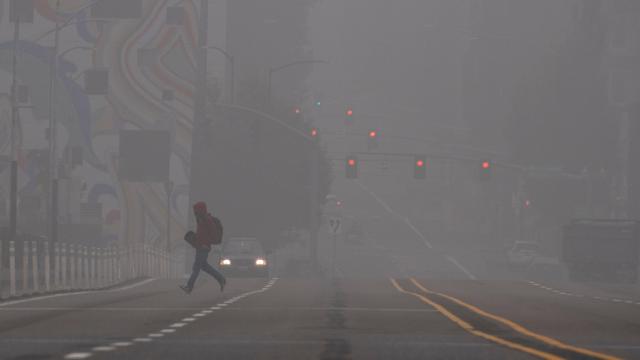Scientists this week are voicing an urgent warning to the world and its leaders: Climate change is already harming our health, and given current trends, it’s only going to get worse. In a new report from The Lancet, the authors highlight dozens of health impacts linked to climate change, including the increased spread of infectious diseases, deadly heat waves and floods, and polluting wildfires. Much more needs to be done to cut down on fossil fuels and to better prepare for what’s on the way.
The report is the sixth in an annual series, “The Lancet Countdown on Health and Climate Change.” It’s a collection of original and cited research authored by dozens of relevant experts from various countries and organisations that measures the world’s response to climate change and the consequences it’s having on our health. This year, there’s also a policy brief focused specifically on the U.S. The main takeaway from both papers is that we’re nowhere near close to addressing the looming iceberg ahead.
“Climate change is first and foremost a health crisis unfolding right now across the U.S.,” Renee Salas, an attending physician in the Department of Emergency Medicine and an assistant professor of emergency medicine at Harvard Medical School, said at a press conference announcing the findings. “As an emergency medicine doctor, I took an oath to protect the health of my patients. And I can’t do that without action on climate change.”
The report singles out 44 indicators of health that are thought to be strongly tied to a warming climate, while the brief discusses those specific to the U.S. Among these are the spread and expansion of tropical diseases like dengue to the U.S.; the increased vulnerability of people living near the coastland to germs that cause serious gastrointestinal illness and even “eat” away at our flesh; wildfire seasons lasting longer, exposing people to air pollution up to 10 times more harmful than other sources, even from across the country; and more days of exposure to extreme weather events, including heat waves that make the pavement so hot that merely touching it will burn you.
“This was the first year where I can say confidently that I and my patients very clearly experienced the impacts of climate change,” said Jeremy Hess, co-author of the U.S. policy brief, emergency medicine physician, and director of the Centre for Health and the Global Environment at the University of Washington. That region was the epicentre of a staggering heat wave this summer made at least 150 times more likely due to climate change. “I saw paramedics who had burns on their knees, from kneeling down to care for patients with heatstroke. And I saw far too many patients die in the ED as a result of their heat exposure this past year.”
In 2020 alone, the authors of the U.S. policy brief found, Americans over 65 years old were collectively exposed to almost 300 million more days of extreme heat than they would have been during the annual baseline from 1986 to 2005; infants were exposed to 22 million more days. Both groups are especially vulnerable to heat-related illnesses. People of colour, the incarcerated, and those living with poverty also disproportionately face more heat than others.
Despite these ongoing consequences, most countries haven’t done much to stem the tide of climate disaster. The report authors found that 65 out of the 84 countries they studied continued to subsidise fossil fuels as of 2018, ensuring that the use and production of fossil fuels will go on unabated. Those 84 countries represent about 92% of the world’s carbon emissions. Other research has shown that fossil fuel expansion needs to end next year to have a shot at meeting the Paris Agreement stretch goal of 1.5 degrees Celsius (2.7 degrees Fahrenheit), a threshold intimately tied to the fate of the world’s most vulnerable.
With countries putting out funds to recover from the pandemic, indications so far aren’t good that fossil fuel use will be going down significantly in the near future. In the U.S, even milquetoast attempts to lower carbon pollution and ensure climate resiliency have long been stymied by the GOP. Most recently, Democratic Sens. Krysten Sinema and Joe Manchin have joined in obstruction, blocking climate measures in the reconciliation bill currently winding through Congress.
As with seemingly every report like this, the authors said that it’s still possible to meet the Paris Agreement targets. But it will take more than promises to cut emissions or end fossil fuel use down the road. The report is coming out less than two weeks before this year’s United Nations annual climate talks, known as COP26, that are being held in Glasgow, Scotland this year. The timing wasn’t missed by the authors.
“Bold, ambitious commitments in Glasgow will be the greatest prescription for improved health and equity that the world can write,” said Salas. “This report calls on policymakers to write this urgent prescription before it’s too late.”
